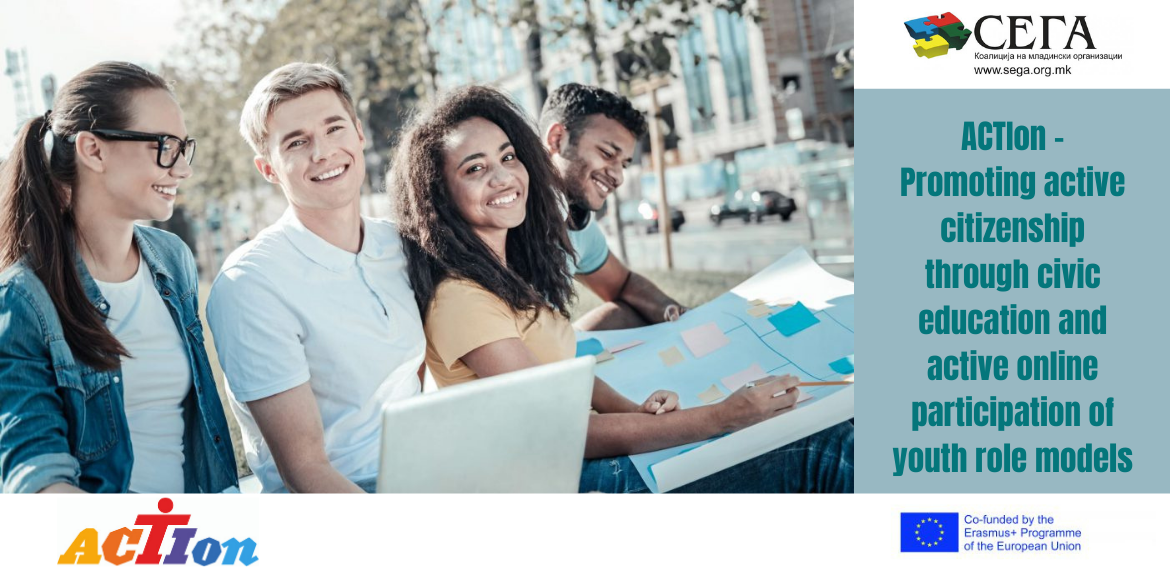
ACTIon – Promoting active citizenship through civic education and active online participation of youth role models
Start: 15-01-2021 - End: 14-01-2024
Project Duration: 36 months
Website: http://www.erasmus-action.eu/
ACTIon brings together six partners from five countries (Belgium, Bulgaria, Germany, Greece, North Macedonia) experienced in education, participation and network cooperation. Our aim is to promote active citizenship through civic education and active online participation of youth role models from socially disadvantaged groups. ACTIon will adapt two innovative good practices that use offline and online training models and tools, and will pilot these in formal and non-formal, community-based education settings in four countries.
The project’s main target groups are adolescents and young people (aged 14-25), youth activists, volunteers and informal peer leaders in non-formal education and community settings like youth organizations and community education centres.
Specific objectives:
- To enhance social and civic competences, fostering knowledge, understanding, and ownership of values and fundamental rights.
- To foster digital skills and competences of digitally excluded groups (migrants and young people from disadvantaged backgrounds)
- To enhance critical thinking and media literacy among learners, parents, and educational staff.
The approach is highly innovative: participatory engagement of adolescents and young people from socially underprivileged regions, ethnic minority/Roma youth and young migrants/refugees that experience the greatest barriers in terms of social inclusion in the fields of health and general education, the labour market and public life.
ACTIon will scale up:
- The good practice Popular Opinion Leader (POL), a community-level intervention and prevention approach, utilizing youth role models to affect educational and behavioural changes in a community. Its adaptation to an online environment and its alignment with digital competence, citizenship and civic education will help address disadvantaged youth groups and their social environment in new ways.
- Digital online participation and education tools. The use of I.R.E. – From Idea to Reality and Execution, an app for smartphones, and the eParticipation platform will be implemented at both individual and community level. The goal is to combine online and offline education to complement each other and foster active participation of the youth groups.
By doing this, the project will help develop and implement innovative methods and practices to foster inclusive education and promote common values, which will be tested in diverse settings in Bulgaria, Germany, Greece, and North Macedonia. We will focus on socially underprivileged regions where young people experience the greatest difficulties and barriers in terms of social inclusion in the fields of health and general education, labour market, and public life.
The project’s immediate beneficiaries will be roughly 100-120 young leaders trained as role models during the piloting phase, 50-60 of which according to the Popular Opinion Leader (POL) model. The trained POLs will have the capacity to reach a further 300 to 500 community peers from their immediate social environment and networks. Around 120 youth activists are expected to become engaged with e-participation educational projects through the online tool and digital appliance (App).
The expected impact is that active and deliberate digital youth participation will help strengthen the resources of young, disadvantaged learners, newly coming migrants and Roma/ethnic minority communities, empowering them to engage in pro-active social (online) participation through self-organised piloting projects with the digital tool.
Ultimately, the results of this project will inform practice-driven policy recommendations, targeted at a European level to support policy advocacy for social inclusion through (digital) citizenship education.
Expected Outputs:
- Evaluation Report: Executive summary with policy factsheet outlining the innovative value and impact potential of ACTIon models;
- Modular curriculum with training modules in POL training as role models, civic education, digital skills, media and health literacy;
- Piloting, assessment and re-adjustment of the good practice models in Bulgaria, Germany, Greece, and North Macedonia with case studies from effective piloting.
Project Partners:
- Nexus Institute for Cooperation Management and Interdisciplinary Research (nexus) Germany (coordinator)
- Health and Social Development Foundation (HESED), Bulgaria
- Open Space Foundation (OSF), Bulgaria
- ALL DIGITAL, Belgium
- Action Synergy S.A., Greece
- Coalition of Youth Organizations SEGA, North Macedonia

